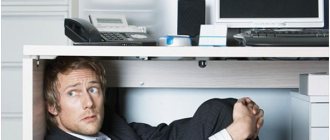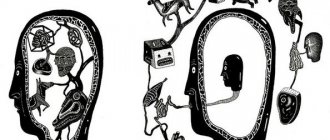Not everyone likes noisy companies and communication, but when solitude becomes the meaning of life, and being in a group brings psychological suffering, this is an unhealthy situation.
A social phobe voluntarily refuses to live a full social life and prefers solitude.
For such an individual, being in the company of other people brings not just psychological discomfort, but also real mental suffering.
You can independently suspect that you have a similar problem and find out whether a person is really considered a social phobe using a psychological test.
Psychological test for social anxiety
1. Can you easily eat or drink in public?
2. Do you sometimes feel like you are being watched?
3. If the situation requires it, can you talk down to strangers?
4. Do you agree with the statement that you should not talk to strangers under any circumstances?
5. Can you stay at home because you are afraid of the outside world or strangers?
6. Do you quickly adapt to the company of new acquaintances?
7. Do you have a fear of saying something wrong when talking with friends?
8. Do you feel awkward when people look at you?
9. Do you use the Internet to share your ideas instead of doing it face to face?
10. Do you think that you know more than others, but cannot demonstrate it because of shyness or anxiety?
11. Do you feel nervous talking on the phone with a stranger?
12. Are you afraid of being judged by people around you?
13. Do you avoid appearing in public because of fear or anxiety?
14. Can you easily imagine that others consider you anxious, weak, crazy, stupid, boring?
15. When in social situations, are you worried that people will notice that you are experiencing symptoms of anxiety: flushing, trembling, sweating, confusion of thoughts and speech?
16. Do you worry before writing something on social networks because you are afraid that your statement may offend someone or be viewed incorrectly?
17. Does reluctance to communicate affect your career, family life or relationships?
18. Do you worry if you have to visit a new place or communicate with previously unfamiliar people?
19. Will you be able to read a report in front of a large audience of listeners?
20. Do you get nervous when you walk into a room where everyone is already sitting?
21. If you are late for a lecture or meeting, will you not enter the room at all because of anxiety?
22. Will you express your opinion if you do not agree with what has already been voiced, which was supported by other listeners?
23. Do you easily look into the eyes of a stranger?
24. Can you be the first to talk to a person if you like him?
25. Are you worried if you need to ask directions from a random passerby?
26. Do you easily refuse an intrusive salesman or sales agent?
27. Can you just listen out of politeness to an interlocutor who is not at all interesting to you?
28. Do you prefer to stay at home on the weekends instead of having fun with a group?
29. Do you prefer working alone than in a team?
30. Are you ready to put up with injustice because you are afraid to enter into an argument or discussion?
Plugin sponsor: Tests for girls
What should a social phobia person do?
There are many remedies for this problem, including medication. But the most effective is behavioral therapy, when, under the guidance of an experienced specialist, social phobics gradually develop new attitudes at the time of assessing situations that cause anxiety.
Those who are interested in this can go to the channel of a psychologist-hypnologist. Here you will find exercises for panic and fear, audio trances and meditations for panic attacks and many other useful things on psychosomatics.
You can contact a psychologist-hypnologist through the VKontakte page.
Additional tasks
You might be interested to know:
- How prone you are to succumb to stress and overreact emotionally to a situation.
- Is your partner committed to a serious relationship and ready to take responsibility?
- What level of anxiety do you have?
- Having depressive or suicidal thoughts.
- Level of sexuality and intimate preferences.
3-Minute Sociopathy Test
The 3-Minute Sociopathy Test (IDR-3MST) was developed by IDRlabs. The IDR-3MST is research-based and provides information for educational purposes only. This test is in no way associated with any specific research in the field of psychopathology or specific educational institutions.
The 3-Minute Sociopathy Test from IDRlabs is based on research by Associate Professor of Psychology Michael Levinson, FBI Advisor Robert Hare, and many others. For more information on sociopathy (also called psychopathy, antisocial personality disorder), please consider the following works: Levenson, M.R., Kiehl, K.A., Fitzpatrick, C.M. (1995). Assessing psychopathic attributes in a noninstitutionalized population. Journal of Personality and Social Psychology, 68, 151-158. Miller, J. D., Gaughan, E. T., and Pryor, L. R. (2008). The Levenson Self-Report Psychopathy Scale. An Examination of the Personality Traits and Disorders Associated With the LSRP Factors. Assessment, 15, 450-463. And: Sellbom, M. (2011). Elaborating on the construct validity of the Levenson self-report psychopathy scale in incarcerated and non-incarcerated samples. Law and Human Behavior, 35, 440-451.
The work of Dr. Levinson and Dr. Haer has also formed the basis of several other well-known screening tests, such as the Psychopathy Identification Test and the Psychopathy Test, which are available on our website. All of these tests are intended for clinical use by qualified mental health professionals. Our test provides information for educational purposes only. IDRlabs and this Sociopathy Symptom Test are in no way affiliated with the above researchers, organizations, or institutions.
The 3-Minute Sociopathy Test is based on established and well-established work for the clinical assessment of symptoms of sociopathy, which is also called psychopathy and antisocial personality disorder. However, please note that all free online tests like this one are for informational purposes only and will not be able to determine your symptoms with absolute accuracy and reliability. Therefore, our test provides information for educational purposes only. Only a certified specialist can provide detailed information about your mental state.
As the creators of this free online test to determine whether you are prone to sociopathy or similar personality disorders, we have made every effort to ensure that this test is reliable and valid through extensive testing and statistical data control. However, free online tests such as this one provide information “as is” and should not be construed as providing professional or certified advice of any kind. For more information about our online tests, please read our Terms of Service.
The essence of the concept of social phobia
Social phobia is a type of anxiety disorder that results in the occurrence of negative emotions and physical symptoms while being in a crowded place.
The condition is aggravated by performing activities in public, such as speaking in front of an audience or working in a team.
Social anxiety and phobia do fall under the umbrella of anxiety disorders. Although it is likely that these diseases are rare, they do occur in ten percent of the population. Often, disorders are not recognized because victims avoid trigger situations and are afraid to seek help and receive treatment.
To determine the level of social phobia on the anxiety scale, take the online test just below.
Treatment of social phobia
The success of treatment directly depends on how correctly the diagnosis is made and how accurately the causes of the disorder are established. Treatment takes into account the individual characteristics of the body, the duration of anxiety and the influence of the environment (family, work, neighbors, etc.).
Treatment of social phobias includes a combination of the following techniques:
- Psychotherapy.
- Biofeedback therapy.
- Drug treatment (neurometabolic therapy, psychopharmacotherapy).
- Physiotherapy.
- Massage. Physiotherapy.
If communication with people causes severe fear or panic, this is a reason to consult a doctor. Social anxiety disorder is highly treatable with psychotherapy and medication.
Causes of social phobia
The causes of social phobia are also related to genetics. Numerous studies conducted since the sixties have shown that phobias are more common among relatives within the same family. It is also assumed that educational processes or psychological trauma lead to the emergence of a phobia. Especially when unpleasant experiences were obtained in social situations, this may be accompanied by a generalized reaction in the form of a phobia.
Examples of situations that cause the development of social fear:
· Cruel attitude of parents and use of physical punishment .
· Anxious parents who constantly changed the requirements for their child, criticized or humiliated him.
· Bad experience of communicating with people around you.
· Problems communicating with the opposite sex.
· The presence of obvious physical disabilities that were ridiculed by peers in childhood.
The most famous study in this regard was carried out by Kendler and colleagues (Neal, Kessler, Heath and Eaves) in 1992. Also, the essence, causes and consequences of social fear are described in the book by Olga Razmakhova and Nicky Wodwood. Psychologists have also developed tests to identify the state on the social anxiety scale.
Social phobia: how to get rid of social fear?
PsychologySocialphobiaPhobia
Social phobia is strong, persistent, unreasonable fear and anxiety of various social situations: situations of communicating with other people, meeting other people, the need to speak, speak publicly, etc. More precisely, strong anxiety and fear of evaluation, observation, careful examination of oneself by other people when performing some social action.
Social phobia is on a par with other phobias, but since its influence on people’s lives is quite strong, it needs to be considered separately. In this article I will talk about the symptoms of social phobia, the causes of social phobia, and the existing modern methods of treating social phobia, how social phobia can be dealt with. Let's start with the last one.
Treatment methods for social phobia
There are 4 possible treatments for social phobia:
- Personal (individual) psychotherapy.
- Group psychotherapy.
- Psychotherapy online, psychotherapy from books, you can also add self-help here.
- Medicines.
I will not consider all possible variations of psychotherapeutic treatment. They undoubtedly exist in any direction of psychotherapy that exists in science today. In this article I talk only about cognitive and cognitive-behavioral psychotherapy for social phobia, because that’s what I do, that interests me, and that’s what I’m good at.
| Personal psychotherapy | Group psychotherapy |
| Work one-on-one with a psychologist All attention - only to your case Cognitive-behavioral psychotherapy Weekly, approximately 3 months Read more → | Work in a group of 4-6 people Attention is paid to other cases Cognitive-behavioral psychotherapy Weekly, 12 sessions Read more → |
Symptoms of social phobia
Social phobia comes in a variety of forms and variants, and the degree of its intensity and the degree of its impact on the quality of life vary. But all these options have one thing in common: a persistent and noticeable fear of situations when you are forced to face one or another form of public speaking, talking with people, or face one or another form of evaluation of you by other people. This fear is accompanied by the fear of being publicly humiliated, embarrassed, disgraced, looking bad, etc. This is symptom number one.
- Symptom number two: if such a situation does happen, then with a high probability, before, after or during the situation, severe anxiety arises, up to a panic attack.
- Symptom number three: the fear is actually excessive or unreasonable.
- Symptom number four: avoidance behavior is taking place, that is, the person is somehow trying in every possible way to avoid getting into such a situation, and if it doesn’t work out, then he experiences intense stress with anxiety.
- Symptom number five: all of the above significantly affects normal life, work, classes, studies, communication with other people, etc.
- Symptom number six: all of the above occurs in an individual over 18 years of age and lasts for at least six months.
That is: if someone avoids communicating with people because they irritate him terribly, and not at all because he becomes very anxious in their presence, this is not social phobia. If someone is nervous when they have to give a presentation in front of colleagues at work, but this nervous anxiety does not cause any particular problems and does not lead to a refusal to speak, this is not social phobia.
It's completely normal to worry that other people might not approve of you.
Social phobia can be specific: someone is afraid of public speaking in front of an unfamiliar audience, someone worries only when visiting restaurants or using other public places, someone worries when they write something and are being watched, someone is normal speaks in front of close and familiar people, but not etc. Other variants of social phobia can be generalized, in which case they include fear of a wider range of social situations: meeting new people, the inability to refuse others, difficulties with making and attending dates, etc. .P. However, whether with a specific type of social phobia or a generalized one, as a rule, there is always some degree of fear of public speaking.
Almost every person has such fears from time to time, and even such famous actors as Bruce Willis, Tom Cruise and others admitted that they have certain social fears.
There is a time-tested test for social phobia - the Liebowitz (Leibowitz) Scale - to assess the symptoms of social phobia, you can take it now (opens in a separate window).
Modern theories of social phobia emphasize the role of thinking and thought processes in the formation and maintenance of social phobia:
- Firstly, with social phobia there are well-defined typical beliefs and ideas that contribute to the development of social anxiety, and well-defined anxious thinking styles.
- Secondly, when a person with social phobia comes into contact with other people (or in some social situation), he tends to focus as much as possible on his internal sensations. Because of this overly attentive observation of one's reactions, a person becomes overly sensitive to the slightest changes in his inner fear or anxiety, exaggerating its degree and significance, as a result of which an incorrect image of himself is formed.
- Third, people with social phobia consistently engage in a variety of so-called “safety or defensive behaviors,” which allows them to reduce the risk of negative evaluation from others. There is very frequent avoidance of situations in whole or in part.
- Fourthly, they exaggerate how negatively others actually evaluate them, do not have certain behavioral skills, and tend to overestimate other people’s reactions to their behavior to their disadvantage.
- Fifth, before and after a social situation, people with social anxiety ruminate excessively about the situation, focusing on past failures, self-deprecating thoughts about themselves, and negative predictions for the future.
All these nuances are “processed” by the thinking of such a person in the smallest detail, and therefore are permanently fixed in memory, resulting in a “vicious circle”: social phobia “feeds itself.”
If you have the above symptoms, and you scored 30 points or more on the Liebowitz Scale, then read on. Perhaps this information is just for you.
Causes of social phobia
According to researchers, up to 12% of the world's population suffers from social phobia in one form or another, and approximately equally, both men and women. Scientific psychologists of various directions have long been trying to determine what can cause social phobia, but the cognitive-behavioral model of social phobia has received the most widespread and scientific substantiation. Accordingly, within the framework of the same model, the most effective methods of overcoming social phobia have been developed.
As a rule, generalized social phobia arises quite early in childhood (average age - 10.5 years, according to Manuzza et al., 1995), and specific social phobia arises later - on average at the age of 16.9 years.
So far there has not been a single scientific confirmation that it is the unsuccessful experience of public speaking that plays a significant role in the formation of social phobia. For example, Steinberg et al. examined 22 people with generalized social phobia, 16 people with specific social phobia, and 25 people without social phobia, asking them whether they had any experience of traumatic social interaction (for example, an objectively very bad public speaking experience). According to the results of this study, half of the subjects with generalized social phobia, 40% of the subjects with specific social phobia, ... and 20% of healthy subjects had such psychological trauma! According to other studies (Öst, Hugdahl), only 15% of those who had traumatic experiences developed social phobia.
It is believed that social phobia is most likely related to a person's innate ability to easily associate fear with angry, critical or rejecting faces of other people, or with direct eye-to-eye gaze, especially if the faces are directed towards the person rather than away from them. This hypothesis is confirmed by research by Öst & Lundh, where it was found that subjects with social phobia tend to interpret different photographs of human faces much more quickly and easily as aggressive or critical, rather than as approving and supportive. That is, there is an initial tendency to evaluate others as critical (while they may be neutral).
Heredity also plays a certain role in the occurrence of social phobia. People are three times more likely to develop social phobia if they have a family member with social phobia. One twin has a 15% to 24% chance of developing social phobia if the other twin develops social phobia.
Early precursors of social phobia are shyness, which is inherited genetically, and a kind of “suppression behavior” in childhood: avoidance of contact, avoidance, fear of unfamiliar people and situations, overexcitation of the sympathetic nervous system, which is responsible for controlling breathing, pulse, and other physiological reactions.
Results of cognitive behavioral therapy for social phobia
Well, finally, we got to the most interesting thing: how does social phobia treatment occur in such a “miraculous” way in cognitive behavioral therapy (in any format: group, individual format) that its effectiveness is equal to the effectiveness of medication?
Various details and scientific justifications are presented in the relevant professional literature, here I will tell you in general. The essence of this therapy is that each participant is given individual opportunities to learn and understand that in fact social situations are not so frightening, their mistakes do not look so terrible, and their inability to behave can be corrected. Over the course of session after session, the therapist encourages these opportunities to be explored, ensures that the information is assessed and processed correctly, and provides support and encouragement to participants to become active in improving their lives. As therapy progresses, the effects extend into the long term because participants learn to be their own therapists, trying different skills after therapy ends.
The first part of therapy is devoted to informing, explaining why social phobia exists, what supports it; the second part is actually a variety of exercises aimed at getting rid of social phobia, and the third part is devoted to preventing relapses and consolidating acquired knowledge and skills.
The main gains after cognitive behavioral psychotherapy can be described as follows:
- skills of behavior in social situations are acquired;
- there is a chance to allow anxiety to “melt away” on its own and naturally;
- a chance to become calmer in social situations, and stop considering social phobia a nightmare of a lifetime;
- self-learning and self-instruction skills for the future are acquired.
A few words about the treatment of social phobia with medications
Drug treatment for social phobia is also possible. Currently, the most common prescribed drugs are: serotonin reuptake inhibitors, MAO inhibitors, benzodiazepines, tricyclics and other antidepressants and beta blockers. In the United States, only some SSRIs (selective serotonin reuptake inhibitors) are approved for use for social phobia. Other types of medications, especially benzodiazepines and beta blockers, have not been proven to be effective. In addition, there is a danger of addiction to benzodiazepines.
In this article, I am not going to discuss in detail the effectiveness and differences in the use of these drugs; for prescription medications, please contact your doctor, psychiatrist or psychotherapist. For me as a consulting psychologist, it is important that the effectiveness of medications is almost the same as the effectiveness of cognitive behavioral psychotherapy.
Provided by SendPulse
Treatment methods
Therapy begins with easing symptoms. In severe cases, this can be done with the use of medications such as antidepressants or sedatives. Milder forms of social phobia are worked through with a psychologist in group or individual therapy. is also an effective way to relieve anxiety .
An effective way to overcome social phobia is behavioral therapy. It begins when the victim realizes that his fear is unfounded and will treat the accompanying mental disorders. It is also useful to learn relaxation techniques so that a person can learn to control the situation and cope with their irrational fear.
Consequences of social fear
Social phobes know that situations that cause fear and panic are not actually dangerous, but they cannot cope with their emotions on their own. Fear itself ultimately motivates you to avoid situations that cause negative feelings. Especially when it comes to school or exam anxiety, which is also a social phobia.
Common side effects of social phobia are depression, obsessive-compulsive disorder or addiction. Therefore, some patients develop alcohol dependence, drug addiction, and gambling addiction. Psychoactive substances dull excitement and anxiety attacks.
In the worst case scenario, people with a phobia isolate themselves and no longer maintain social contacts, which causes serious negative consequences.











